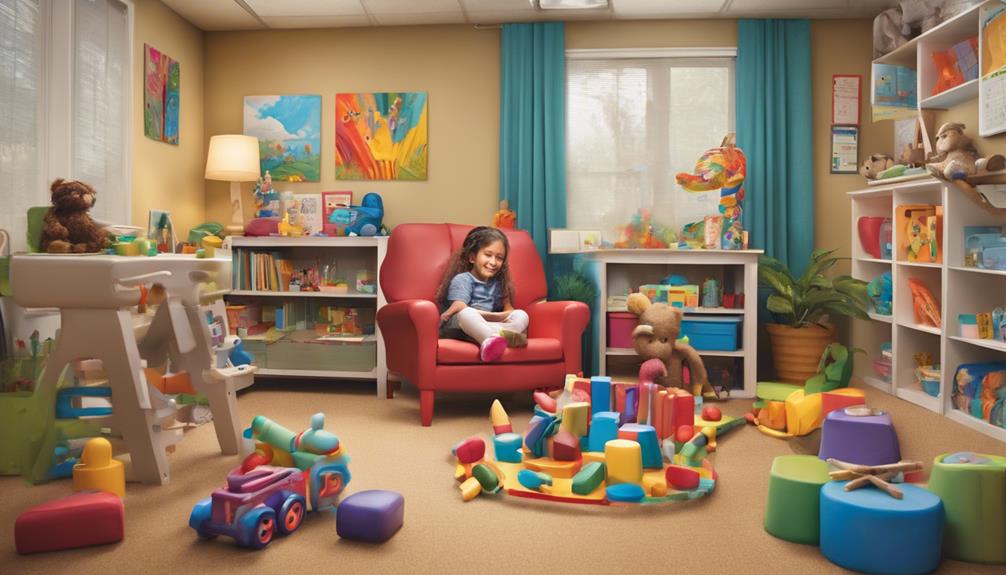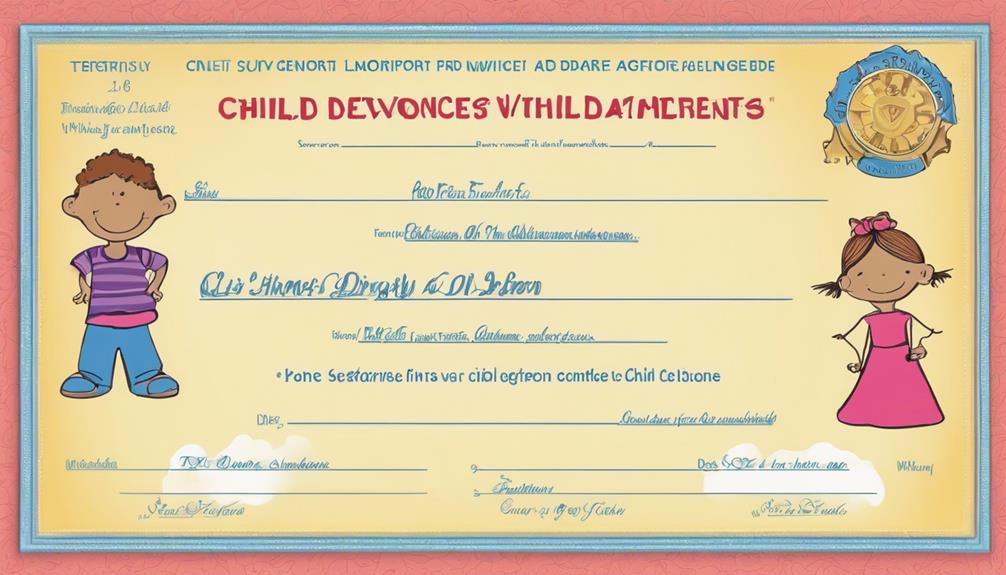So, you think children are just miniature versions of adults when dealing with divorce? Think again. Children benefit from divorce counseling in ways that may surprise you.
From improved communication skills to building resilience and adaptability, the impact of counseling on children's well-being is profound. But that's just the tip of the iceberg.
Let's explore how these young minds navigate the complexities of divorce with the help of counseling.
Key Takeaways
- Improved communication skills and emotional regulation support children through the challenges of divorce.
- Providing a safe space for emotional expression helps children process their feelings in a healthy way.
- Divorce counseling promotes emotional well-being, aiding children in adjusting to new family dynamics.
- Strengthening parent-child relationships and fostering healthy coping mechanisms are long-term benefits of divorce counseling.
Improved Communication Skills
In divorce counseling, children develop improved communication skills to express their feelings and concerns effectively.
Through learning how to communicate their needs clearly and assertively in a supportive environment, kids are equipped with the tools to navigate the complexities of divorce more effectively.
These enhanced communication skills not only assist children in managing their own emotions but also enable them to address conflicts that may arise in a constructive manner.
Enhanced Emotional Regulation
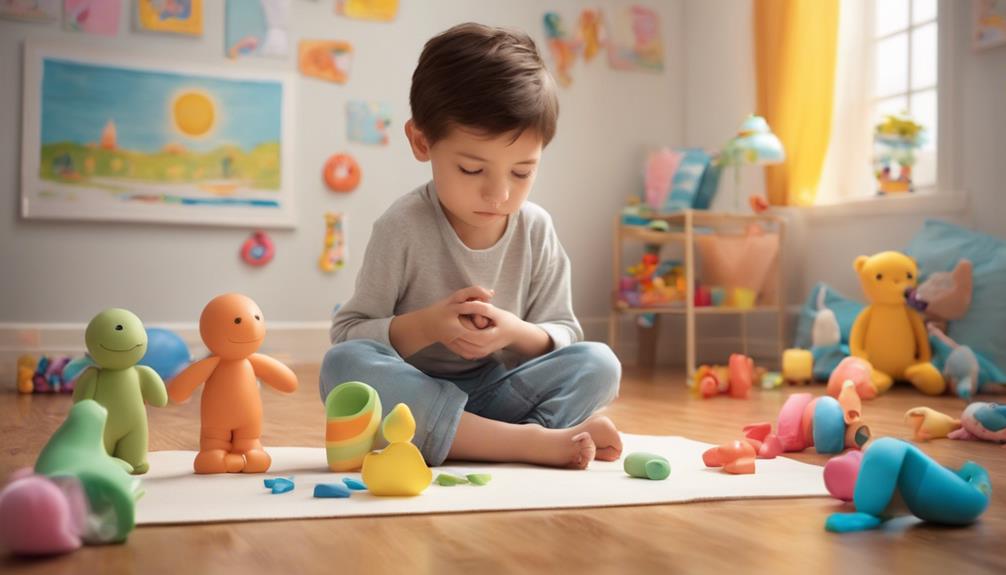
Through divorce counseling, children acquire the tools to cope with their emotions and enhance self-awareness.
By learning to express themselves constructively, children can better navigate the emotional rollercoaster that comes with divorce.
These skills not only reduce negative outcomes like anxiety and depression but also empower children to handle future challenges with resilience.
Coping With Emotions
Understanding and managing emotions is crucial for children going through divorce, and divorce counseling plays a key role in enhancing their emotional regulation skills. By learning coping skills and receiving emotional support in a safe environment, children can navigate feelings of sadness, anger, and confusion more effectively. This support helps them develop healthy ways to express and manage their emotions, leading to improved academic performance and social interactions.
Counseling equips children with the tools to understand and process their emotions, promoting resilience and adaptability during and after the divorce process. By enhancing emotional regulation through counseling, children are better equipped to cope with the challenges they face, fostering their overall well-being and emotional growth.
Developing Self-Awareness
Divorce counseling guides children in recognizing and managing their emotions, fostering self-awareness and enhanced emotional regulation skills. In sessions led by a child psychologist, kids learn to navigate their emotional and psychological landscapes with understanding and care.
By providing a safe space for children to express their feelings, counseling helps them develop a deeper awareness of their inner world. Through guided activities and discussions, children gain valuable tools to cope with the challenges of divorce, ultimately leading to improved emotional intelligence and resilience.
Learning to identify and communicate their emotions constructively not only supports children in the present moment but equips them with lifelong skills for managing stress and navigating complex emotions.
Development of Healthy Coping Mechanisms
As we explore the topic of developing healthy coping mechanisms in children post-divorce, it's crucial to understand the significance of building emotional resilience and fostering effective communication skills.
By equipping children with the tools to navigate their emotions and communicate constructively, we empower them to handle stressors in a positive manner.
These skills lay the foundation for emotional well-being and adaptive coping strategies that can benefit them throughout their lives.
Building Emotional Resilience
In counseling, children acquire essential tools for managing their emotions effectively, enhancing their ability to navigate the challenges brought on by their parents' separation. By helping children develop emotional resilience and healthy coping mechanisms, counseling plays a crucial role in their post-divorce adjustment. Through counseling, children learn to express and regulate their feelings, leading to improved emotional well-being and mental health outcomes.
This early development of healthy coping strategies can significantly decrease the likelihood of long-term emotional issues and aid children in adapting positively to changes following the divorce. Counseling provides a safe space for children to understand and process their emotions, fostering resilience and equipping them to handle stress and uncertainties in a constructive manner. Ultimately, building emotional resilience through counseling empowers children to face future adversities with strength and maintain healthy relationships with their parents and peers.
Learning Effective Communication
Through counseling, we equip children with the necessary skills to express their feelings constructively and manage stress effectively, fostering the development of healthy coping mechanisms post-divorce. Effective communication learned in counseling sessions helps children navigate the complexities of divorce by teaching them how to articulate their needs and concerns to parents and peers. By fostering these communication skills, children can build stronger relationships and better cope with the emotional challenges that arise during and after divorce. Here is a table highlighting how children benefit from learning effective communication in the context of divorce:
| Benefits of Learning Effective Communication in Divorce Counseling | |
|---|---|
| Expressing feelings constructively | Managing stress effectively |
| Articulating needs and concerns | Building stronger relationships |
Building Resilience and Adaptability
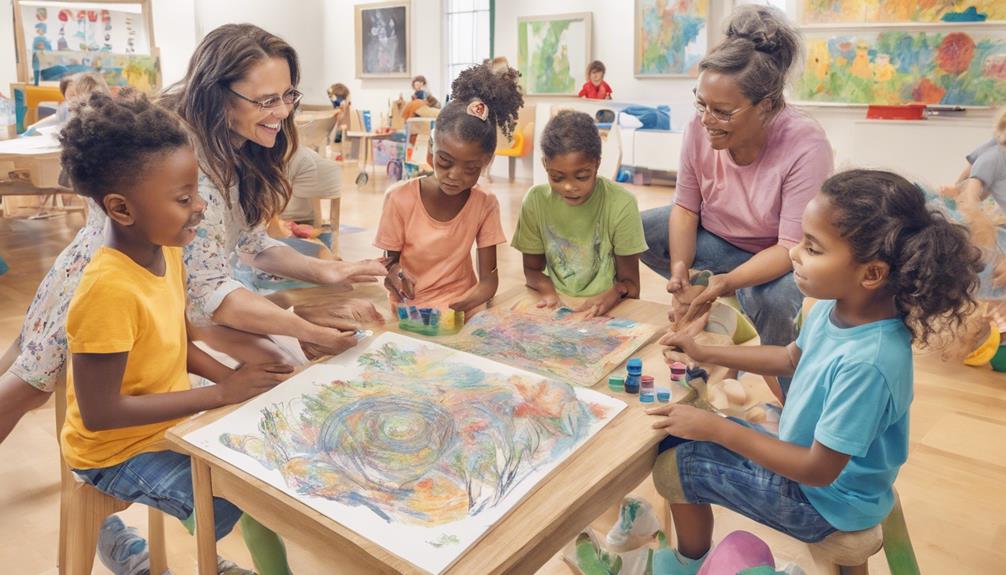
Building resilience and adaptability in children through divorce counseling equips them with essential tools to navigate emotional challenges and thrive amidst changing family dynamics. It's crucial to provide children with the support they need to develop these skills during such a tumultuous time in their lives. Here are five ways children benefit from building resilience and adaptability through divorce counseling:
- Enhanced Coping Skills: Counseling helps children learn effective coping mechanisms to deal with the emotional impact of divorce.
- Improved Emotional Regulation: By developing resilience, children can better regulate their emotions and respond to stress in healthier ways.
- Increased Flexibility: Counseling fosters adaptability, enabling children to adjust to new routines and circumstances post-divorce with greater ease.
- Better Problem-Solving Abilities: Resilience and adaptability promote problem-solving skills, empowering children to face challenges head-on.
- Boosted Self-Confidence: As children become more resilient and adaptable, their self-confidence grows, allowing them to navigate changes with a sense of capability and assurance.
Strengthening Relationships With Parents

Divorce counseling fosters stronger parent-child relationships by nurturing understanding and open communication channels between children and their parents. Through counseling, families can navigate the complexities of divorce in a supportive environment, fostering healthier connections within the family unit. By encouraging open dialogue and empathetic listening, children can express their emotions constructively, leading to a deeper sense of validation and reassurance from both parents.
Counseling sessions provide a safe space for children to voice their concerns and fears, helping them feel understood and valued by each parent. This process not only aids in building trust and respect within the family but also promotes emotional support during a challenging time. By fostering positive relationships with both parents, children can maintain a sense of stability and security amidst changing family dynamics. Ultimately, divorce counseling plays a crucial role in strengthening the bond between children and parents, paving the way for healthier family relationships in the long run.
Encouraging Self-Expression and Emotional Validation
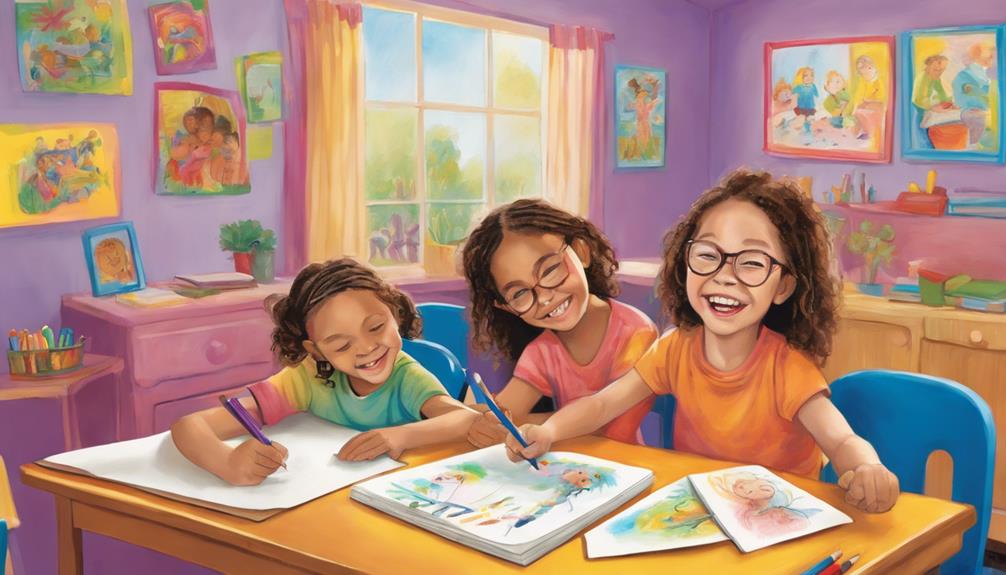
In our counseling sessions, we prioritize encouraging children to openly express their emotions and validating their feelings to promote emotional awareness and understanding. It's essential for kids to feel heard and understood, especially during the challenging time of their parents' divorce. Here's how our approach to self-expression and emotional validation can benefit children in therapy:
- Enhanced Emotional Awareness: By openly expressing their feelings, kids can better understand and navigate their emotions.
- Validation of Complex Feelings: Therapy provides a safe space for children to process emotions like sadness, anger, confusion, and guilt.
- Release of Pent-Up Emotions: Through self-expression, children can alleviate anxiety and develop healthier coping mechanisms.
- Sense of Security and Support: Validating children's emotions fosters a feeling of safety and aids in their emotional adjustment.
- Overall Well-Being: Encouraging self-expression and emotional validation in therapy promotes kids' emotional health and overall well-being during the divorce process.
Providing a Safe Space for Processing Emotions
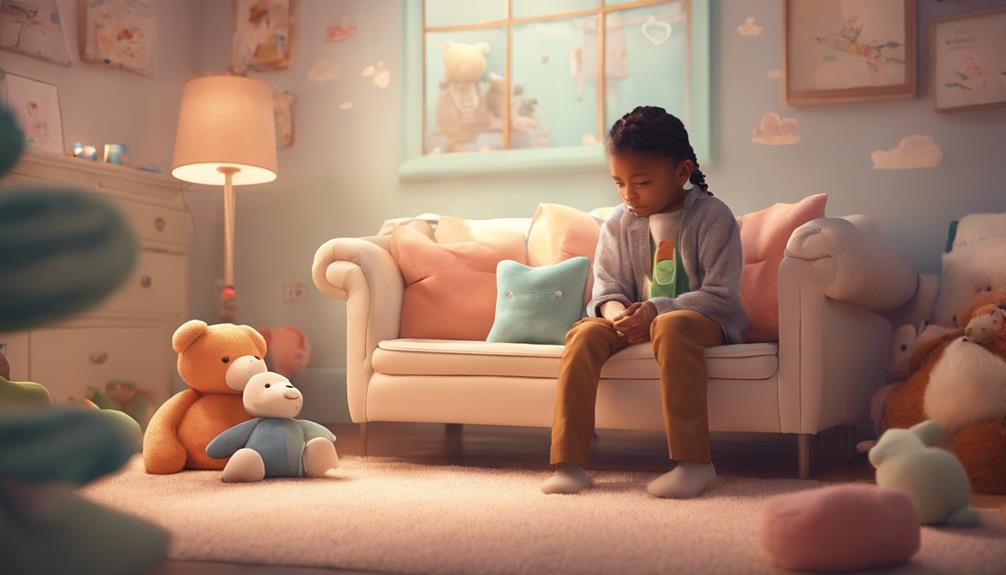
Creating a nurturing environment where children feel comfortable expressing their emotions is a fundamental aspect of divorce counseling. In divorce counseling, children are provided with a safe space where they can process their emotions without fear of judgment. This safe space allows children to explore feelings of sadness, confusion, anger, and guilt in a supportive and confidential setting. By engaging in specialized techniques like play therapy or art therapy, counselors help children effectively communicate and navigate their emotions.
The goal of offering this safe space for children in divorce counseling is to promote their emotional well-being and aid in a healthy adjustment to the changes brought about by divorce. Through these counseling sessions, children can develop coping strategies, build resilience, and gain a better understanding of the divorce process. Ultimately, this leads to improved mental and emotional health outcomes for children going through the challenging experience of divorce.
Frequently Asked Questions
What Are the Goals of Children of Divorce Therapy?
In children of divorce therapy, our goal is to help kids navigate their emotions and fears post-divorce. We aim to promote well-being, offer coping strategies, and enhance resilience. Through play and art therapy, we support their healthy adjustment.
What Positive Lessons Do Children Learn From Divorce?
Navigating divorce, we learn resilience, communication, and self-care. It's crucial to seek help during tough times. Understanding relationships and seeking support shape us. Lessons in coping and emotional well-being benefit us long-term.
Can Divorce Be Beneficial to Children?
Divorce can be beneficial to children by creating a healthier, more stable environment. It allows for improved mental well-being, closer parent-child bonds, and reduced stress levels. Children can thrive in supportive settings post-divorce, leading to overall better outcomes.
What Is Most Important in Helping Children Cope With Divorce?
In helping children cope with divorce, we prioritize emotional support, open communication, stability, and validation. These elements create a safe space for children to navigate their emotions and experiences, fostering resilience and healthy coping mechanisms.
Are there negative effects of divorce on children that can be helped by counseling?
Divorce can be tough on kids, impacting their mental health and behavior. Counseling can help mitigate the negative effects and provide children a safe space to process their feelings. While hilarious divorce memes may offer some levity for adults, it’s important to consider the impact on children’s emotional wellbeing.
Conclusion
In conclusion, divorce counseling for children offers a safe harbor amidst the storm of emotions, providing them with tools to navigate the turbulent waters of change.
Like a guiding lighthouse in the darkness, counseling helps children develop resilience, communicate effectively, and build healthy relationships.
It acts as a beacon of hope, illuminating their path towards healing and emotional well-being.

